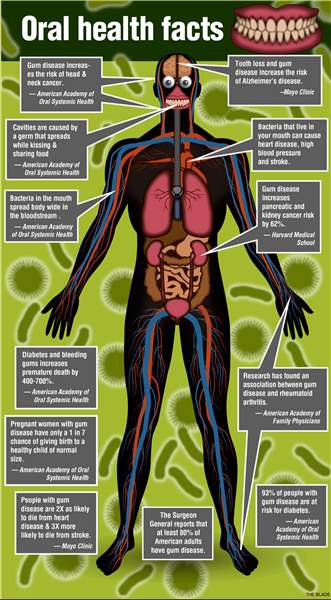
Gum control: Correlation between good oral health and healthy heart is strong
3/17/2014
THE BLADE
Buy This Image

When the dentist stresses the importance of daily brushing and flossing and biannual dental visits, the doctor’s directives are not merely for patients to have an attractive smile and healthy teeth and gums. It’s to benefit your overall health, as a direct link between oral health and heart health has been found.
In fact, neglecting to follow a dentist’s directives can lead to heart disease, high blood pressure, and stroke — and that’s only a glimpse of the possible adverse effects of ignoring the importance of good oral health.
Toledo-Lucas County health commissioner Dr. David Grossman’s initial response to how to persuade the public that there is a link between oral care and the heart is that, “It’s hard to convince patients as to the advantages of oral health. There is some data that show that poor oral hygiene is correlated with shortened life spans.”
Nevertheless, there is a growing awareness of the connection between oral care and overall health. Jayne Klett, director of community development and outreach for the Dental Center on Madison Avenue, said, “It used to be when we talked about it, people looked at us as if we were from another planet.” They don’t anymore, and sometimes people bring it up before she gets to the subject.
And while some are comfortable reading lengthy pamphlets on the subject, Ms. Klett said others may prefer to learn about it in simple language, such as that used by Dr. Ameer Kabour on the subject in his television medical educational minute, “Time Waits for No One,” which addresses various medical issues.
The chief of cardiology at Mercy St. Vincent Medical Center said twice daily brushing and flossing minimizes the risk of infection and tooth damage. But only a dentist can discover hidden problems.
“The scary part is that 40 percent of people with heart conditions have gum disease,” Dr. Kabour said. “The big question they ask is how it happens: Bacteria that grows on the gums affects the inner layer of the heart, which builds up plaque over the years."
Indeed, the elderly often have gum disease because they can't clean their gums as well. But younger people are not exempt. Dr. Kabour said those in their 20s who have periodontal infection or disease could be subject to heart disease sooner, unless they learn to take good care of their gums.
Dr. Kabour said the link between heart and oral health was uncovered several years ago, and the data supporting the discovery "in the last three years has been overwhelming,. That's why you see brochures always in cardiologists' offices talking about care of oral health."
Dr. Gopinath Upamaka, a ProMedica cardiologist, said that the growing interest in the risk factors for heart disease "found that in spite of the fact that we attempt to aggressively go after many of the risk factors, people were still having strokes, blockages, and heart disease."
Since oral bacteria were found in other parts of the body several years ago, Dr. Upamaka said, "It has become obvious that if you have serious gum disease, not just plaque, you are two times as likely to have coronary artery disease. It's a common marker that if a patient has diseased teeth he will likely have coronary [disease]. Prevention is very important. If you have gingivitis, you are at risk for getting heart disease."
Poor oral health, poor diet, diabetes, and poor general overall health are connected.
"A terrible diet will cause poor bone health, poor bone health and infection contribute to gingivitis. So the risk factors for gingivitis are risk factors for heart disease," Dr. Upamaka said. "Is it a matter of coincidence or does one cause the other? That is where the debate is going. But for sure the following is certain: If you have gingivitis, you have double the risk of heart disease than someone who does not."
Typically those who routinely exercise and eat a healthful diet also brush, floss, and visit the dentist regularly. Even so, if oral or other disease is found, it must be treated promptly, Dr. Upamaka said. He also urges abandoning habits that increase risks such as smoking and a lax approach to following doctor's orders.
Interestingly enough, brushing twice a day isn't the whole story, but doing so twice a day for two minutes each time is vital, Ms. Klett said.
"I think the average American brushes from 15 to 20 seconds," she said, adding that "In order for our bodies to be healthy and to fight inflammation, we have to eat well, get rest to fight infections, and get regular dental care.
"It's important to get in to see a dentist. Gum disease is a silent disease. People can have advanced gum disease and have no pain at all. But if you have tooth decay, they will hurt. Periodontal disease is silent; a dental hygienist and dentist can help with that evaluation. You don't know until you have it checked. You might have gingivitis which is reversible. But if you have advanced [gum disease], you need to find a dental home, and share with them your goals, to have a healthy smile, heart, and body."
Contact Rose Russell atrrussell@theblade.comor 419-724-6178.